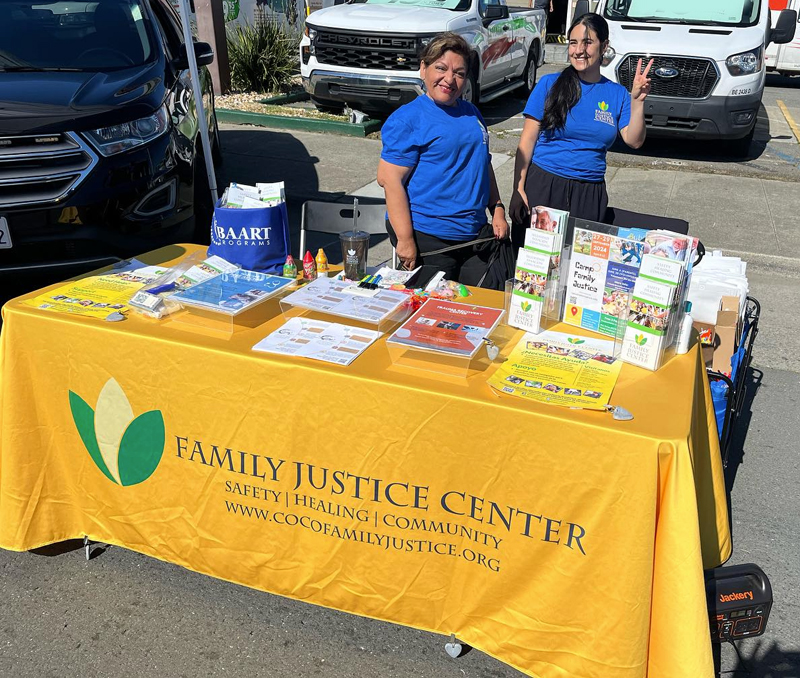Contra Costa Family Justice Center offers resources for survivors

CONCORD, CA (Mar. 31, 2025) — One of the city’s most valuable assets started as a small spark of an idea back in 2011.
Then-Chief of Police Guy Swanger was concerned about the number of domestic violence cases in the city – especially ones he felt were underreported – and knew there was a solution. Why not create a one-stop location where victims could get legal, emotional, housing and other support? He brought the idea to former City Councilmember – now state Senator – Tim Grayson. He took the idea and ran with it, and with the help of the late City Councilmember Dan Helix, the Central Contra Costa Family Justice Center (FJC) was born.
Since 2011, the center has served families affected by domestic violence, sexual assault, child abuse, elder abuse and human trafficking. Tucked into an adobe building at Todos Santos Plaza, the FJC houses therapists, attorneys, and nonprofit agencies that can assist those affected by family and partner violence in one location.
“It’s like one-stop shopping,” says Natalie Oleas, regional director of the center since 2016.
An epidemic of domestic violence
Susun Kim, who runs a thriving center in Richmond, also was instrumental in starting the Concord center. Since 2011, three more centers have opened in Antioch, Danville and Solano County.
“Domestic violence can happen to anyone, regardless of their race, background, education level and financial status,” Oleas says.
She also says it’s not just women who come to the FJC for help. “In 2024, roughly 20% of our clients identified as male.”
According to Concord Police Chief Mark Bustillo, about 70% of domestic violence victims are women. He is a big fan of the FJC’s accomplishments.
“I used to work in a city bigger than Concord, and it was so difficult to get victims the help they needed,” he says. Now, all officers in Concord are trained to tell domestic violence victims about the FJC.
“It helps us, as a force, continue to assist the victims and helps prosecutors get more information.”
Leaving a violent situation
Despite the success of the FJC, officials believe domestic violence is still underreported in Concord and may be rising. Bustillos says there was a 5 percent increase in reports after the pandemic, but he suspects there were more unreported cases. There are also repeat cases.
Oleas agrees, pointing to national statistics that suggest it takes someone seven attempts before leaving an abusive relationship.
“There are several factors that explain why someone may return to an abusive relationship,” Oleas says. “One of the most prominent ones we see is it is very difficult financially to exit a relationship in the Bay Area. If you are living in a two-income household with two children, it’s almost impossible to be financially independent on one income trying to provide for a family of three.”
Abusive relationships are also very complex. “You have families that want the abuse to stop but want the family unit to stay intact,” Oleas adds. “You also need to have a strong enough support system around you to exit an abusive relationship. Often, survivors have been isolated from their families and friends, so they may not have a support system to rely on when they try to leave.”
Variety of support services
That is where the FJC comes in. The center has lawyers on staff to help with legal questions, financial advisors to answer financial questions and, most importantly, representatives from local nonprofits to assist with getting housing, food vouchers if a victim qualifies and counseling services to deal with the trauma.
Oleas says there are 70 partners altogether, although some aren’t on location. But if they’re not, a volunteer from the FJC will direct or drive the family to the site.
Bustillos sees how the center can do what his staff may not.
“It has interpreters who can explain that it is against the law to hit or strike a person, unlike in some cultures,” he says.
These days, attorneys are also dealing with other issues. Alexandra Wilson started her career at the FJC and now runs her own practice in an office just steps away from the center. When she is not working on her own cases, she volunteers with the FJC.
“What’s great about the center is you can get all the information and support you need in just one spot,” she says.
She’s helped with such legal work as writing up temporary restraining orders, but now, she sees many immigrants come through who are “freaking out” about their citizenship status with President Donald Trump’s crackdown on those who are in the country illegally.
Community resource
So, while the FJC is geared toward those suffering domestic violence, it is also a community resource in many ways, says Oleas. The staff has grown from nine to 55 in 14 years, along with many volunteers.
“We’re actually looking for a new home, we’ve grown so much,” Oleas says.
If you or someone you know, adult or child, is suffering from domestic violence, please call the Contra Costa Family Justice Center in Concord at 925-521-6366 or stop by 2151 Salvio St., Suite 201, in Concord. Hours are 9 a.m.-5 p.m. If it is after-hours, please call 211.

Peggy Spear
Peggy Spear is a journalist and frequent contributor to the Pioneer.
